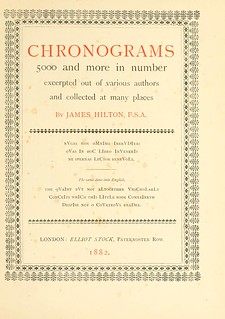
PREV ARTICLE
NEXT ARTICLE
FULL ISSUE
PREV FULL ISSUE
VOCABULARY TERM: CHRONOGRAMDick Johnson submitted this entry from his Encyclopedia of Coin and Medal Terminology. Thanks. -Editor Chronogram. Lettering which contains a date in Roman numerals that are in larger size for emphasis. The letters I, V, X, L, C, D and M are contained in words. The lettering, most often found in the legend, either spell out the date in these Roman numerals, or the numerals add up to the intended date. The date is most charming when it is in typical order of the date in proper number sequence. Because of the great many legends and inscriptions found on numismatic items, particularly medals, chronograms are an important part of medallic art. It is necessary when cataloging these items to be sure to identify chronograms when they appear. It is somewhat of an internal validation if the date (in Arabic numerals) and the year of the chronogram (in Roman numerals) are equivalent. In other instances the chronogrammatic date is the only one given on the item. In numismatic catalogs - like on the coins and medals themselves - the lettering should be in small caps, and the chronogram letters in large caps. Origin of Chronograms. The first known use of a chronogram was in Hebrew in 1208. Arabic chronograms date to as early as 1318. In Germany medallic engravers were employing chronograms extensively in the 1600s. The first use of the term in English was in 1621. Variations. Since I (for the numeral one) is the only vowel among Roman numerals, it is the easiest to include. Because of its infrequency in words X (for ten) is sometimes difficult. When adding the letters a W has sometimes been used for two Vs (two fives), the equivalent for the numeral ten.
Irrespective of these variations, the appearance of a chronogram exhibits the care in choosing the legend and the exact spelling of the lettering. This is the symbolism in the epigraphy that is the equivalent to the use of graphic symbols, like an attribute, in the design. Reference: L3 {1882} Hilton, Chronograms. I found a copy of the 1882 Chronograms book on the Internet Archive, and added the cover image. Another great source is Chapter VI of Robert Turfboer's Tempus in Nummis, one of my favorite numismatic books. I've had a harder time locating a nice color image of a coin or medal clearly illustrating a chronogram. Can anyone help? Thanks in advance. -Editor To read the complete Chronograms book, see: Book lovers should be word lovers as well. Looking for the meaning of a numismatic word, or the description of a term? Try the Newman Numismatic Portal's Numismatic Dictionary at: https://nnp.wustl.edu/library/dictionary Or if you would like a printed copy of the complete Encyclopedia, it is available. There are 1,854 terms, on 678 pages, in The Encyclopedia of Coin and Medal Technology. Even running two a week would require more than 19 years to publish them all. If you would like an advance draft of this vital reference work it may be obtained from the author for your check of $50 sent postpaid. Dick Johnson, 139 Thompson Drive, Torrington, CT 06790. Wayne Homren, Editor The Numismatic Bibliomania Society is a non-profit organization promoting numismatic literature. See our web site at coinbooks.org. To submit items for publication in The E-Sylum, write to the Editor at this address: whomren@gmail.com To subscribe go to: https://my.binhost.com/lists/listinfo/esylum All Rights Reserved. NBS Home Page Contact the NBS webmaster 
|
